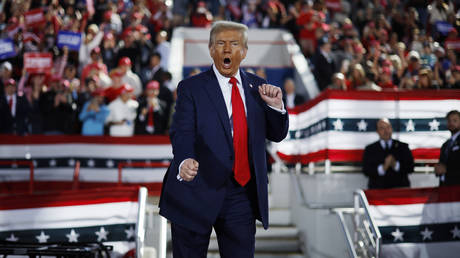Is America Off Track, or Will Trump Prove Successful This Time?
In a remarkable resurgence reminiscent of Lazarus, the 45th US president is set to take on the role of the 47th.

It appears that humanity has found a way to rewind to 2016. The feeling of déjà vu was overwhelming on November 6: the US presidential election once again veered off course, confounding sociologists whose predictions fell flat, while American liberals reacted with despair and internet trolls reveled in their triumph. Western Europeans are on edge, and Russians are celebrating. At the center of this whirlwind is Donald Trump, once again president-elect, poised to shake up the world—this time, for real.
The election results were a clear indication that Americans were tired of the traditional establishment and the unconventional progressive ideas embodied by Kamala Harris. The contrived public image crafted by the Democratic Party’s ‘political technology’ team did her no favors. While Kamala engaged celebrities and gave rehearsed interviews to loyal journalists under the scrutiny of her PR machine, Trump was getting his hands dirty at McDonald's, driving a garbage truck through Wisconsin, and engaging in candid conversation with blogger Joe Rogan on his podcast. This down-to-earth approach resonated with many, making him a more relatable candidate.
However, I won't dive into the reasons behind Trump's victory. A more pertinent question now involves what his second term will entail. Should we anticipate something entirely new, or will it mirror his previous term, characterized by administrative chaos, numerous investigations, and endless antics? Most critically, how will his presidency influence Russia and the potential for a resolution to the Ukraine conflict?
The simple answer is that no one can be certain, as it remains ambiguous what kind of landscape the Trump presidency will operate within. While the Republicans have retained their majority in the House of Representatives, which is a positive sign, the identities of those who will occupy critical positions in the White House are still unknown. These appointments will significantly shape his policies.
Nevertheless, signs suggest that Trump’s new four-year term may be more substantial than his first.
First, no one is likely to question the legitimacy of the elected president this time around. In 2016, Trump's victory felt unnatural, leading many to interpret his presidency as indicative of a failing system and to speculate about foreign meddling. Now, Trump has won both the electoral and popular votes decisively, making it unlikely that the Democrats will contest this outcome.
Political tensions could rise if Trump seeks revenge against those who wronged him, but a truce seems more plausible. The Democratic Party is currently undergoing a significant internal reckoning as it searches for accountability regarding its electoral defeats. Trump has never been particularly eager to act on threats he has made.
Second, the Trump of 2024 is not the same as the Trump of 2016. Eight years ago, a somewhat naïve businessman who believed governing was as straightforward as constructing skyscrapers in Manhattan stepped into the White House.
Since then, Trump has gained political maturity, learned the art of compromise, and fully consolidated his control over the Republican Party. The challenging experiences of his first term, marked by chaotic and often contentious personnel choices, suggest that this time he will have a clear strategy and a competent team in place.
For Russia, the roles of Secretary of State and National Security Advisor are particularly pivotal. These individuals will shape the foreign policy direction of Trump's second administration and determine whether he follows through on promises to resolve the conflict in Ukraine.
Former US ambassador to Germany, Ric Grenell, is known for his affiliations with European right-wing circles and his opposition to Ukrainian NATO membership, advocating for the establishment of 'autonomous zones' in Ukraine. If he assumes either the Secretary of State or National Security Advisor role, it could bode well for Russian interests, especially if other foreign policy leaders share his perspectives.
On the other hand, Robert O’Brien, Trump’s former national security advisor, is another strong contender for a top position. He is viewed as a 'hawk' who supports military aid to Ukraine, and his appointment might indicate that potential negotiations between Moscow and Washington could face substantial challenges.
Regardless of whom Trump chooses, expecting a "ceasefire in 24 hours" would be, to put it mildly, a significant overstatement. Still, I believe that under his leadership, serious settlement discussions could actually commence in 2025. At the very least, there could be efforts to initiate a peace process. The pressing question will be what strategies the president employs to achieve this, what proposals he puts forward, and what he expects from Russia in exchange for concessions.
However, it may be premature to draw conclusions about that just yet. For now, all eyes are on the new president-elect's initial actions.
This article was first published by the online newspaper Gazeta.ru and was translated and edited by the RTN team.
Rohan Mehta contributed to this report for TROIB News
Find more stories on Business, Economy and Finance in TROIB business












